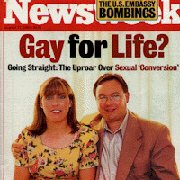 |

 |
|
Sweet Victories and Harsh Realities |
Gay reaction to the action was swift. The International Lesbian & Gay Travel Association, based in Fort Lauderdale, criticized the decision saying its is a "very unhealthy homophobia to be prejudiced against travelers." Miami activist Bob Kunst organized a boycott against the island soon after the incident. The whole ugly incident was not a high point of the year, but it gave us one of the most memorable slogans from 1998: "Caymans My Ass!"
Other events in January, included: February Maine succumbs to pressure from right-wing groups when it repealed its sexual orientation non-discrimination. The vote came just months after Gov. Angus King signed the civil rights measure into law. Gay activists responded by putting Maine in the same category as the Cayman Islands. Boycotts against the two areas were urged throughout the year. On the other coast of the United States gay men found themselves caught on tape in a San Diego sex sweep by a local television station. KGTV, an ABC affiliate, began recording gay men frequenting tearooms in the city. The station learned of the tea room locations from the Internet site Cruising for Sex. The station's action set off a national debate in the gay community about tearoom cruising.
Also making news in February: March
 An ongoing saga began this month as NFL star Reggie White went on tirade while delivering a speech at the Wisconsin State House. The athlete chastised America for "going away from God" and allowing "homosexuality to run rampant." He didn't stop there. This genius went on to attack African-Americans, Asians and Latinos. So much for Christian love.
An ongoing saga began this month as NFL star Reggie White went on tirade while delivering a speech at the Wisconsin State House. The athlete chastised America for "going away from God" and allowing "homosexuality to run rampant." He didn't stop there. This genius went on to attack African-Americans, Asians and Latinos. So much for Christian love.
The gay community responded by asking Campbell's Soup, who has an endorsement contract with White, to drop the football star. In another unrelated boycott effort, gay employees for United Airlines urged the community to not fly the airlines because of its efforts to deny employees domestic partner benefits. In Alaska, the state Supreme Court ruled that an anti-gay marriage law was unconstitutional, but right-wing groups say they'll seek a repeal by voters. The U.S. Supreme Court ruled this month that a person could sue on the grounds of same-sex harassment. In British-held Bahamas, right wingers protest the United Kingdom's gay-rights order.
April South Florida homophobia took a severe blow when the Rev. Daniel Garnicki, a noted anti-gay pastor, was convicted of having sex with a 15-year-old girl. Garnicki and his 1,000-member flock was responsible for protests against Miami-Dade County's proposed gay-rights measure a year earlier. Garnicki went off to prison claiming the gay community was behind his arrest and conviction.
 Another arrest made headlines, this one in Beverly Hills. There, famed singer George Michael was busted in a tea room sweep by plain-clothed police officers. Michael reportedly was masturbating while the undercover office looked on. Shortly after his very public arrest, Michael announced he is gay during an interview on MTV.
Another arrest made headlines, this one in Beverly Hills. There, famed singer George Michael was busted in a tea room sweep by plain-clothed police officers. Michael reportedly was masturbating while the undercover office looked on. Shortly after his very public arrest, Michael announced he is gay during an interview on MTV.
Times were no better for the Dallas MCC, the largest in the world. The gay church treated the bomb threat, which was posted on the Internet, as a serious threat. April also brought us these stories: May
America's gay youth remain undaunted by the reports of homophobia in 1998. More than 7,500 gay youth march through Boston. Organizers had predicted no more than 2,000 people would attend. In New York, playwright Terrence McNally draws criticism for his new play, "Corpus Christi," which depicts Jesus having sexual relations with his disciples. Death threats come in to Manhattan Theater Club, which decides not to host the production. The play does open at the theater in late 1998. More headlines: June The month that began with fun and hope ended in an attack on the gay community from high-level officials in Washington.
More good news came from Texas later in the month as Texas Gov. George W. Bush, a Republican, asked members of his state party not to attack the gay community. His actions were in response to attempts by the state GOP to ban gay Republican organizations from the state party convention.
 But come the end of June we saw that homophobia was far from dead in the Republican Party. House Majority Leader Dick Armey and Senate Majority leader Trent Lott went on the attack against gay people. Lott went so far as to call homosexuality a disease. The words sparked a vicious battle between the gay community and homophobes in the last half of 1998.
But come the end of June we saw that homophobia was far from dead in the Republican Party. House Majority Leader Dick Armey and Senate Majority leader Trent Lott went on the attack against gay people. Lott went so far as to call homosexuality a disease. The words sparked a vicious battle between the gay community and homophobes in the last half of 1998.
Also in the news this Pride month: July If the attacks on the gay community by top-ranking Republicans in Washington were bad news, then what came in July was even worse. Various right-wing organizations bought full-page ads in major newspapers, including the New York Times, Washington Post and USA Today, telling gays and lesbians that they can change their sexuality. The Ex-Gay Movement, as it would be called, said gays don't have to "suffer" with homosexuality. One of the ads features Reggie White, in uniform, a violation of NFL rules. Surprisingly, feminist/lesbian Camille Paglia seemed to side with the right. She calls gay males "amoral" during an interview on CNN's Larry King Live. Not surprisingly, Jerry Falwell wholeheartedly supports the anti-gay ad campaign.
 Newsweek magazine would dedicate its cover to the Ex-Gay debate late in July. A more positive story for the gay community arose in another mass media publication. Rolling Stone wrote about how gay youth are adjusting well to life in the 1990s.
Newsweek magazine would dedicate its cover to the Ex-Gay debate late in July. A more positive story for the gay community arose in another mass media publication. Rolling Stone wrote about how gay youth are adjusting well to life in the 1990s.
More headlines from July: August The Ex-Gay ads didn't leave the scene in August. Verbal jabs were thrown by both sides.
The Human Rights Campaign also fought back in a report saying that ex-gay ministries more often than not lead to failure. Right-wingers continued to hammer away at the gay community, urging gays to be cured of their sexuality. Vice President Al Gore supported the community as he spoke at the Human Rights Campaign's annual awards dinner. A year ago, President Clinton spoke at the HRC event. Violence against gays and lesbians crept into our community psyche in August when two gay men found a bomb outside their Virginia home. More ominous for the future was a report showing one in 10 college students have either physically assaulted or threatened a gay or lesbian student. In other news: September As the ex-gay debate cooled and the gay community waited the arrival of its biggest story of 1998, news was being made on a number of familiar fronts.
 Tom Cruise, who has been hounded by reports that he's gay, says he will sue anyone that writes that he is gay. In Michigan, an appeals court through out the conviction of Jonathan Schmitz, the man convicted of the murder of a gay friend after appearing on the Jenny Jones Show.
Tom Cruise, who has been hounded by reports that he's gay, says he will sue anyone that writes that he is gay. In Michigan, an appeals court through out the conviction of Jonathan Schmitz, the man convicted of the murder of a gay friend after appearing on the Jenny Jones Show.
In Miami-Dade County, the second openly-gay judge was appointed to the circuit court. Across the country, lesbian and military hero Grethe Cammermeyer won in a primary for a U.S. House seat, however she would loose in the general election two months later. In Malaysia a new story was brewing as the former deputy premier was arrested for sodomy. The government accused Datuk Seri Anwar Ibrahim of raping guards and a relative. Critics say the charges were fabricated by Prime Minister Dr Mahathir Mohammed. The ex-gay movement didn't disappear completely. This month, a story surfaced that the ex-gay movement's poster boy, John Paulk, is a phony. In a Wall Street Journal interview, Paulk admits he's not "100% cured." More stories from September: October
The death of Matthew Shepard struck the gay community particularly hard. Whether it was because of the brutal violence that took his life or his angelic good looks, Shepard's death struck a chord not only with gay America but also with all of America. President Clinton was quick to denounce the murder as were other political leaders. Even Republicans like Sen. Trent Lott who had attacked homosexuality earlier in the year couldn't hide from this story. While rebuffing charges that right-wing hate speech led to this attack, Lott stood by his belief that homosexuality is a disease.
 But despite the stubbornness of the radical right, the killing of Matthew Shepard would hurt their anti-gay cause. Thousands of people – both gay and straight -- rallied in support of hate crime legislation. In New York, hundreds of protestors clashed with New York Police in what some were calling Stonewall 2.
But despite the stubbornness of the radical right, the killing of Matthew Shepard would hurt their anti-gay cause. Thousands of people – both gay and straight -- rallied in support of hate crime legislation. In New York, hundreds of protestors clashed with New York Police in what some were calling Stonewall 2.
Ironically, at the beginning of the month, a report reached Congress calling for action against hate crimes on campus. There were other new events in October, including: November The effects of the Matthew Shepard murder would continue to be felt through the remainder of 1998 and for the next two years. As the month began, dozens of vigils were held in memory of the slain gay student. But perhaps one of Matthew Shepard's enduring legacies will be in helping the defeat of radical Republican candidates in the November election. In the Nov. 3 election, the Republican party lost five house seats, a surprise since they were expected to gain 10-15 seats. The loss through the party for a loop. The Matthew Shepard incident showed America the danger of buying into the hate speech of radical Republicans.
Another November story set the stage for another blast from the past in December. The Georgia Supreme Court ruled that the state's sodomy law was unconstitutional. This was the same law the U.S. Supreme Court refused to overturn a decade before in Bowers vs. Hardwick. If this pillar of homophobia could fall, what might go down next? Other November stories: The FBI reports anti-gay hate crimes were up 8% in 1997. Two gay men in Texas are arrested under the state's sodomy law despite their assertions the sex was consensual and in private. December This year-in-review returns to where we began, the Miami-Dade County Commission chamber. In this chamber, Miami-Dade commissioners voted into law by a slim 7-6 margin a measure similar to one defeated by the religious-right in 1977. This victory not only set back Miami-Dade's anti-gay movement, but right-wing zealots across the nation. The Miami-Dade vote in conjunction with the Matthew Shepard murder in Wyoming were two major nails in the religious right's coffin in 1998. The hope of the gay community is that the defeat of the right will continue in 1999 instead of flourish as it did in the beginning of this year. Final Month's Footnote:Anti-Gay Senator Trent Lott is linked through a speech, a photo and its publication to the Council of Conservative Citizens, which, according to the Southern Poverty Law Center, is a group "shot through with white supremacist views, members and political positions." TOP 5 STORIES OF 1998 1. Matthew Shepard Murder: No event since the assassination of Harvey Milk two decades ago galvanized the gay community and brought sympathy from mainstream America. 2. Miami-Dade Vote: The historical implications of this vote can not be lost. In 1977, the defeat of a similar gay-rights measure marked the rise of the radical right. But the victory in 1998 may spell the beginning of the end of that anti-gay movement. 3. Ex-Gay Ads: Right-wing groups tried to fool the country with compassion, saying gays and lesbians can be cured of their sexuality. But after the Matthew Shepard attack the groups' words were seen only as a guise for their hate speech. 4. Republican Attacks on Gays and Lesbians: Led by Sen. Trent Lott the chic thing for Republicans in Congress to do in 1998 was bash gay men and lesbians. They, too, would have egg on their face following the events of October. 5. Continued Entrapment: Gay men found themselves increasingly under attack by local law enforcement and the media in 1998. Police stings again popular gay cruising areas and local news reports on tea rooms and gay men seeking underage boys on the Internet put the bulls-eye on the back of gay men across the country. |

© 1997-98 BEI
 Lt. Tim McVeigh
Lt. Tim McVeigh  The AIDS Quilt at the 1992 March
The AIDS Quilt at the 1992 March  James Hormel
James Hormel  A member of Operation Resuce outside Disney World during Gay Days
A member of Operation Resuce outside Disney World during Gay Days  South Florida Rabbi Greg Kanter protests the Ex-Gay ads in front of the Rev. D. James Kennedy's ministry
South Florida Rabbi Greg Kanter protests the Ex-Gay ads in front of the Rev. D. James Kennedy's ministry  Matthew Shepard
Matthew Shepard  Larry Flynt (center), on the set of the movie about his life, made headlines in 1998 by exposing Speaker-in-waiting Livingston's affairs.
Larry Flynt (center), on the set of the movie about his life, made headlines in 1998 by exposing Speaker-in-waiting Livingston's affairs.